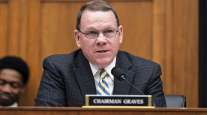Trump Wants $200 Billion for Infrastructure, OMB Director Says

President Donald Trump plans to propose spending about $200 billion in taxpayer dollars on an infrastructure development plan that would leverage private financing, his budget director said, adding that the plan won’t be ready until this fall.
“We’re certainly going to spend some money,” Office of Management and Budget Director Mick Mulvaney said April 20 at an event sponsored by the Institute of International Finance. “The president wants a trillion dollars worth of work on the ground and we’re going to give it to him.”
Trump ran for president in part on a promise to pour money into U.S. roads, airports and other public works. However, he has so far disclosed few details about how he’d pay for the improvements, and how much of the money would come from public versus private sources.
Mulvaney said there might be a “5-to-1 sort of leverage ratio on that.” His remarks suggested that the total spending would amount to $1 trillion, and Trump has consistently said he wants to invest $1 trillion over 10 years by leveraging private capital.
The plan is “in its early discussions” and won’t be ready until the fall, Mulvaney said.
The administration has sent different signals about the timing of its infrastructure initiative. The initial plan called for addressing it after passing measures on health care and taxes, but after a health care bill failed to get a vote, Trump started talking about combining infrastructure with a new health care bill or another measure to get Democratic support.
“Probably use it with something else that’s a little bit harder to get approved, in order to get that approved,” Trump said during an appearance in Kenosha, Wis., on April 18. “But infrastructure is coming and it’s coming fast.”
The timing is “still a little bit up in the air,’’ depending on whether the infrastructure proposal moves alone or with another measure, DJ Gribbin, special assistant to the president on infrastructure policy, said April 12 at a Wall Street Journal forum in Washington. Transportation Secretary Elaine Chao said in a podcast the week ended April 15 that a plan could emerge in the third quarter.
The administration is using a “very broad” definition of infrastructure that includes veterans’ hospitals and privatizing the air traffic control system, Gribbin said. It has convened 16 federal agencies focused on identifying new “transformational’’ projects that create jobs and economic impact; finding existing projects that can be accelerated; targeting policies, regulations and statutes that need to be changed; and reviewing funding and financing options.
Republican House Speaker Paul Ryan and Senate Majority Leader Mitch McConnell have said any infrastructure plan will need to rely on private funding to avoid adding to the deficit. Democrats and even some Republicans have argued that more direct federal spending is needed.
Public-private partnerships, for example, require a revenue stream such as tolls or regular tax payments that aren’t feasible in rural and low-income areas or for refurbishments and other types of projects, critics say.
“The president has clearly indicated that there will be additional resources, but where the resources come from and what level of those resources is still being determined," Gribbin said at the Wall Street Journal event.
The White House previously has said that all funding and financing options are being considered. Gary Cohn, director of the White House National Economic Council, has suggested using taxes on corporate profits returned from overseas, known as repatriation, as a source for infrastructure.
Representative John Delaney of Maryland, co-chairman of the New Democrat Coalition’s Task Force on Infrastructure, has sponsored a plan to use repatriation for infrastructure and said pairing Trump’s infrastructure plan with a tax bill makes sense.
Spokesmen for Senate Minority Leader Chuck Schumer and House Democratic Leader Nancy Pelosi have said combining health care with infrastructure won’t work because Democrats won’t support cutting the Affordable Care Act — and Republicans won’t back a bill that doesn’t limit Obamacare.




